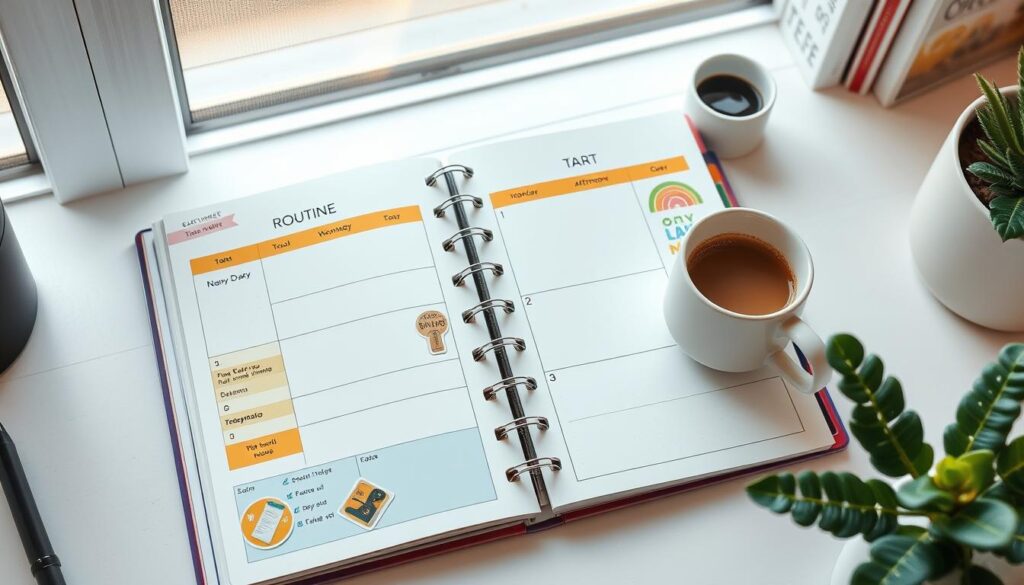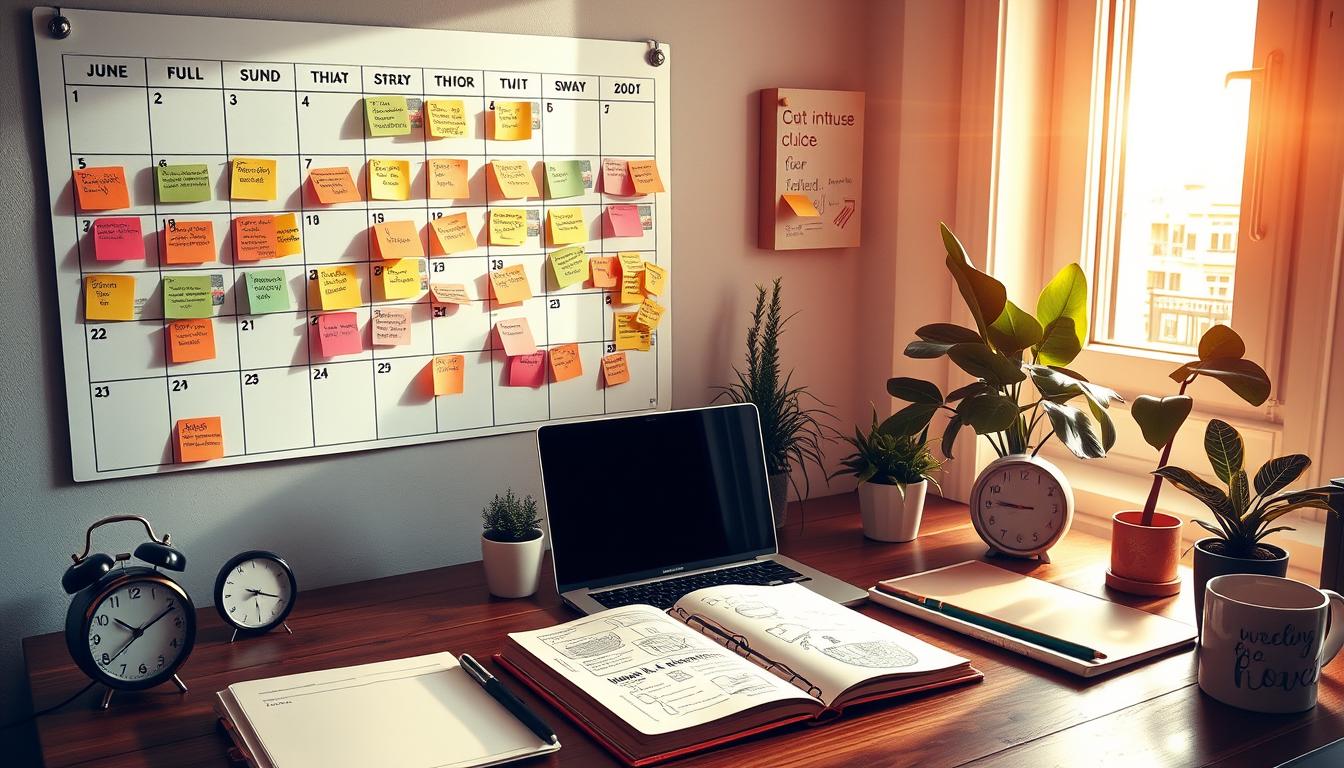Creating a daily routine can greatly improve your life. A good routine helps you stay productive and feel good. It helps you plan your day based on what you need.
Experts say a routine brings order to your day. It boosts your mental health and gives you control over your life.
When starting a daily routine, aim for small goals. Break big tasks into smaller ones. This way, you won’t feel overwhelmed.
Use charts and colors to remember important tasks. This makes sticking to your routine easier.
Remember, pick what’s truly important for your routine. Having free time helps you deal with surprises. This makes your routine more flexible and lasting.
Stick to your routine for at least 30 days. This will help you become more productive and form good habits.
By the way, if you want to learn how you can make REAL money online with no previous experience required, click here to learn the proven method that is working for complete beginners.
Understanding the Importance of a Daily Routine
Creating a daily routine can greatly enhance your life. It sets up a structure that boosts both mental health and productivity. Studies show many benefits of sticking to a routine. It helps you handle life’s challenges and care for your well-being.
Benefits for Mental Health
A daily routine can significantly improve your mental health. It brings a sense of safety and stability, which is key for managing stress. Regular activities lower anxiety and improve your mood.
Following a routine trains your brain to certain patterns. This boosts your confidence and self-esteem.
Impact on Productivity
A well-organized routine also improves your productivity. It helps you manage your time better and work more efficiently. By cutting down on decision-making, you can focus on your tasks.
The repetition in a routine builds good habits. This makes it easier to reach your personal and professional goals. Plus, it reduces procrastination and helps you move forward towards your goals.
Identifying Your Personal Needs
Creating a daily routine starts with knowing what you want to achieve. Recognizing your goals, whether big or small, is key. It helps you focus on what drives you, making your daily habits more meaningful.
Prioritizing Your Goals
Setting priorities helps you focus on what’s most important. Start with small goals to build momentum. This way, you can add more challenging tasks later.
Setting realistic goals makes it easier to stick to your routine. Tracking your progress boosts motivation. This helps you stay on track, even when it gets tough.
Recognizing Your Preferences
Knowing what you like affects your daily habits. It helps you add activities you enjoy to your schedule. When your goals match your preferences, following your routine is more fun.
Finding a balance between routine and spontaneity is key. It keeps your mind happy and healthy.
Setting Realistic Goals
Setting realistic goals is key to growing personally and professionally. By focusing on clear targets, you can make the most impact. This boosts your productivity.
Breaking Down Larger Goals
Breaking big goals into smaller tasks boosts motivation. Achieving achievable milestones builds your confidence. It connects you to your big vision.
Use SMART goal-setting for clear goals. This means your goals are specific, measurable, attainable, relevant, and time-bound. It helps you stay focused and follow a healthy daily routine.
Creating Achievable Milestones
Setting achievable milestones gives you a sense of accomplishment. Daily goals help you stay focused and track your progress. Studies show writing down goals increases success.
Try setting three to four goals a day. Use time-blocking to stay productive and avoid distractions. This builds habits that support your long-term goals.
Plotting Out Your Daily Routine
Creating an effective daily schedule needs careful planning and organization. A daily routine planner is a great tool for this. It lets you see your day, set priorities, and add flexibility to your routine.
Using a Daily Routine Planner
Successful leaders use daily planners to manage their time well. A daily routine planner helps you organize your activities and focus on important things. Begin by spending 10-15 minutes each day planning. Set an alarm at the same time every day to keep things consistent.
Mark your priorities—use labels like high, medium, or low to focus better.

Scheduling Key Activities
Effective scheduling lets you set aside time for your tasks. The Pomodoro Technique is great for focusing on one task for 25 minutes, then taking a five-minute break. This boosts your productivity.
Try to complete one big task each day. Aim for 5-7 important goals each week. Changing how you do tasks can make you more efficient.
Adding variety to your schedule, like breaks or changing where you work, keeps you motivated. Tools like Notion, Friday, and MyDailyPlanner help organize your schedule. Being flexible in your week keeps your routine healthy.
Establishing Healthy Daily Habits
Creating a routine that focuses on healthy habits is key to a fulfilling life. Adding exercise to your daily routine boosts energy and mood. Choose activities you love to make it easy and rewarding.
Regular exercise, like walking or strength training, is good for your mind and body. It improves emotional and physical health.
Integrating Exercise into Your Routine
To live healthier, set clear, achievable exercise goals. Aim for 30 minutes a day or join group classes. Being consistent is crucial.
Regular activity boosts heart health and can add years to your life. Remember to drink plenty of water to stay energized during workouts.
Incorporating Mindfulness and Meditation
Mindfulness, like meditation, is vital for daily habits. Spending time each day on reflection helps clear your mind and lowers stress. Even a few minutes of focused breathing can improve your mood and thinking.
By adding mindfulness to your routine, you support both your mental and physical health.
Creating a Morning Routine that Works for You
Creating a morning routine that fits you can change how you start your day. It helps you feel ready and positive. By focusing on growth and self-care, you set a good tone for the day.
Starting Your Day with Intent
Many successful people wake up early, around 5 AM. This time is for personal growth. It includes simple tasks like drinking water and doing pushups.
With most adults getting less than 7 hours of sleep, finding a balance is key. Make your morning tasks reflect your interests and goals. This makes sticking to your routine easier.
Tip: Use Checklists for Your Morning Tasks
Using a checklist for your morning routine can be very helpful. Start with four habits to build consistency over 30 days. Simple actions like eating well or going for a run boost your energy.
Don’t skip a day, as it adds a day to your commitment. A good morning checklist improves your focus and boosts productivity.

Designing an Evening Routine for Better Sleep
Creating a calming evening routine is key for better sleep. It helps your mind and body relax, leading to quality sleep. By adding soothing activities, you tell your body it’s time to unwind.
Winding Down Effectively
Start by turning off all electronics. Set your phone to “do not disturb” around 9:30 pm and keep it out of your bedroom. This helps your mind relax. Try reading a book, journaling, or doing quiet breathing exercises.
These activities ease stress and prepare you for a good night’s sleep.
Avoiding Electronics Before Bedtime
Using screens can mess with your sleep signals. Make your bedroom a sleep haven with blackout blinds and a silk eye mask. Gentle yoga or a warm bath can also help.
These habits not only get you ready for bed but also improve your sleep quality.
Staying Consistent with Your Daily Routine
Keeping up with your daily routine is key to reaching your goals. The hard part is staying consistent. Use a journal or app to track your progress. This helps you see what you’ve done and what you need to work on.
Starting your day with a glass of water is a small habit that helps. It keeps you hydrated and reminds you of the importance of routine.
Tracking Your Progress
Watching your progress helps you see what you’ve done well and what you can improve. Adding new habits to your routine can make you more productive. For example, meditating in the morning can make your day better.
Tracking these changes shows you’re improving your life. It’s not just about doing things; it’s about making your life better.
Accountability and Support Systems
Talking to friends or family about your goals can really help. They can encourage you when you feel down. Remember, being consistent is about trying hard and being flexible.
By spending time with loved ones, you show that you value well-being. This is important for keeping your routine on track.

